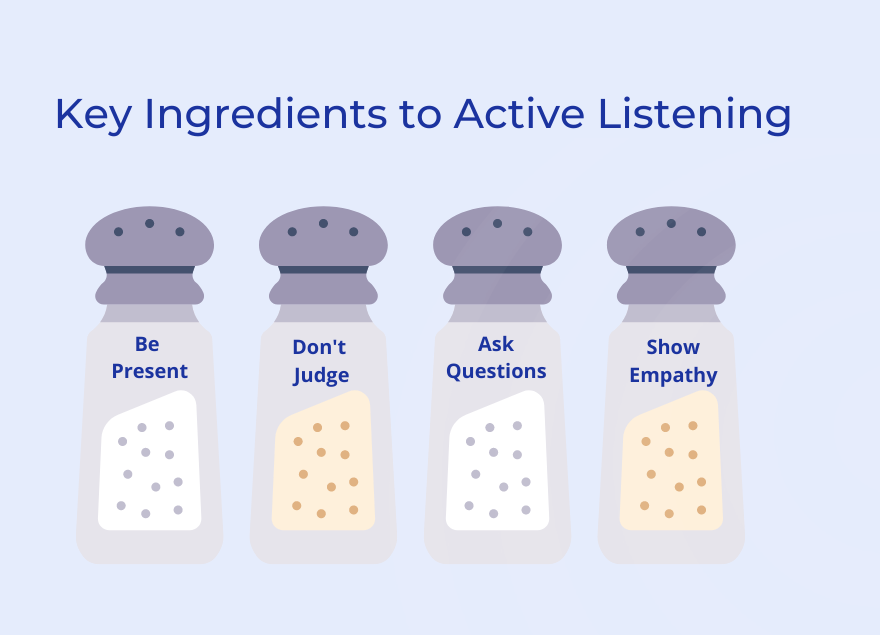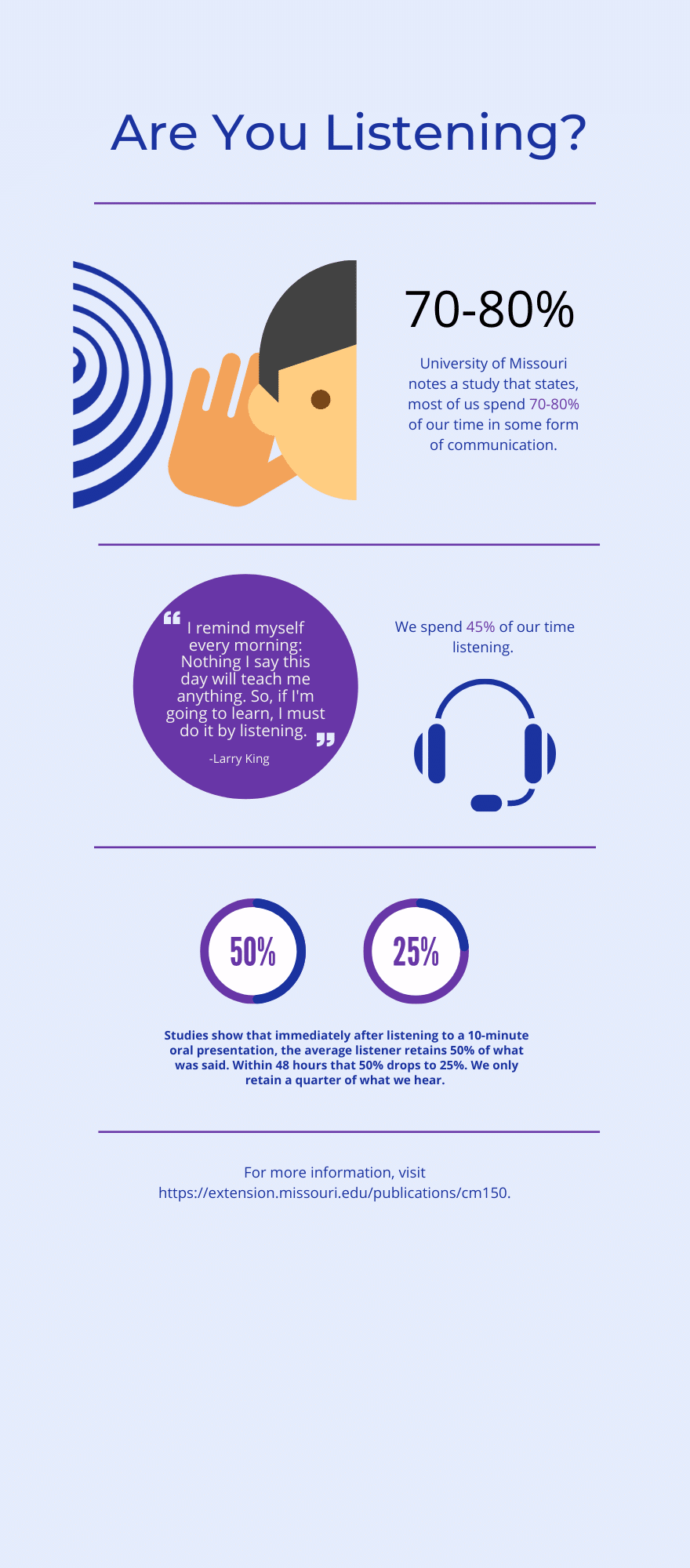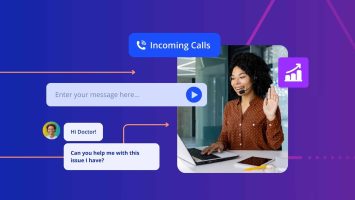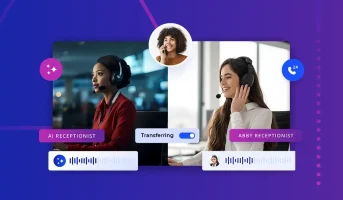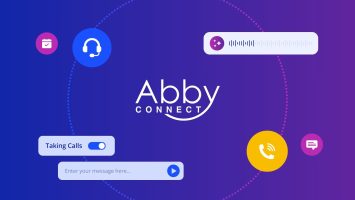One of the fundamental keys to providing exceptional customer service is effective listening. Communication is a huge part of the day-to-day life of anyone in the customer service field. We know that what we say to others is important, but how we listen and engage is just as critical.
Oftentimes, we just skim the surface of people’s true feelings and thoughts due to our lack of questions. We know it to be true that many times, what we say may not be what we truly and deeply feel. This is why mastering the art of asking questions and paraphrasing is such an important tool to have in your customer service toolbox.
When you actively start working on your listening skills and your question asking, you unlock a whole new realm of deep and meaningful conversations. This is important because the people you serve may have a hard time articulating their true feelings and desires.
For example, you could be helping a customer who may be feeling frustrated because they did not get their order on time. On the surface, it appears that they are only upset about the delay. By taking a few extra minutes to ask questions and to paraphrase, you realize that this is their third time calling in about this issue, and their fourth delay issue with your company, so your customer may feel that they cannot trust your company anymore.
Now that you have taken the time to fully understand why your customer is frustrated, you’ve unlocked one of their deeper feelings, the feeling that they can no longer trust that your company follows through on the promises that your company delivers to its customers. Knowing this, you now have the opportunity to address their deeper feelings and can work your customer service magic to repair their negative perception of your company.
In another situation, a customer can be angry that their paperwork was filed incorrectly. At first, it may seem like a simple and unjustified frustration, but by asking a few questions to your customer, you’re given the opportunity to truly get down to the bottom of their frustration and work to help them resolve their issue. In this scenario, if you ask questions and take the time to empathize, there’s a possibility that this customer’s mother recently passed away, so getting everything in order is of utmost importance to this customer. We never truly know what customers are going through or what their day was like; therefore, taking the time to empathize can make your calls more human.
When your listening skills and empathy lack, your relationship with your customers can be very transactional. Whereas, if you spend time to really listen to your customer’s concerns, you can create an extraordinary experience. No one appreciates being treated like another call, another number, or another statistic on your report.
It may seem that customer service at its core is to provide answers to our customers, but how can we provide an answer to a situation we don’t have much clarity over?
As stated in the WhosOn.com article, 8 Probing Question to use in Customer Service Conversations, “In customer service conversations, customers don’t always get to the heart of the issue right away. Often, you need to find out more detail about both the problem and the impact it’s having on your customer.”
We are all human. We have layers, and so do our problems, issues, and concerns. Improving your listening skills and questioning techniques helps you peel off those layers to get to the center of the issue at hand.
Common Listening Mistakes:[CH1]
Many times, our customer service woes come down to our communication skills. It rings true that a substantial component of our communication skills is how well we listen. After training receptionists myself and scoring their calls, I have found that listening can be especially challenging over the phone because we have more leeway to wander off in our thoughts.
Reality check! Which one of these three actions are you guilty of?
- Daydreaming– What’s for lunch? What am I going to do after this call? What could I be doing right now if I wasn’t on this call?
- Staying Silent the Entire Conversation– To listen effectively I have to stay silent for at least five minutes hearing the customer’s story. Maybe I’ll chime in with an “mhm.”
· Assuming that What the Customer Says is Completely How They Feel– “They told me their issue, so it must be true.”[CH2] Nope! We’re human, try again. Maybe by the 3rd time you ask me the same question, I’ll get down to it. Try not to assume that because you asked one question, you suddenly know the entire issue. It takes asking questions in different ways to give you a more 360-degree view of the situation.
The University of Missouri notes in one of their studies that they conducted, listening is one of our most used communication skills, and the study also raises attention to the lack of resources invested into bettering our listening skills. Many seminars and self-improvement books[CH3] [MC4] push us to become better speakers, yet there isn’t nearly as much emphasis on the enhancement of our listening skills.
In the University of Missouri’s publication about listening, it is noted that our thought speed is greater than our speaking speed. As noted, “Another reason for poor listening skills is that you and I can think faster than someone else can speak. Most of us speak at a rate of about 125 words per minute. However, we have the mental capacity to understand someone speaking at 400 words per minute (if that were possible).”
The University of Missouri continues, “This difference between speaking speed and thought speed means that when we listen to the average speaker, we’re using only 25 percent of our mental capacity. We still have 75 percent to do something else with. So, our minds will wander.”
This study explains why active listening is crucial to our customer service skills. It shows how naturally, our minds have the capacity to multitask while we listen, but I would argue that although we have the capacity to multitask while someone is pouring their heart out on a call, we must try to stay as actively present and engaged as possible.
What is Active Listening?
Active listening by definition is “the process of attending carefully to what a speaker is saying, involving such techniques as accurately paraphrasing the speaker’s remarks.”
Oftentimes, we think that what we say and know is what brings us true success, but the true ingredient to successful communication is the ability to listen. You can say amazing words to whomever you are communicating with, but if you are not addressing your speaker’s true needs, your words won’t have much merit.
Those who listen, paraphrase, acknowledge, reassure, and empathize have a better shot at deciphering the information that is given to them by their speakers.
Active listening is cooked up by many different ingredients. Here are a few ways you can instantly improve your active listening skills:
- Be present in the conversation – If you’re daydreaming or running through your to-dos in your head while someone is talking, you will most likely have a difficult time establishing a true connection with the other party. People can feel when they do not have someone’s full attention. Make that person feel important by blocking out any distractions and allowing yourself to be mentally present.
- Be open-minded throughout the conversation – We’re human. It is natural to be opinionated, so it becomes that much more important to focus on having unbiased conversations. Being present and open-minded during a conversation, allows you to get as close as you can to understanding the other person’s perspective.
- Ask questions to confirm your understanding – Asking questions is powerful. It can be easy to shy away from asking questions in an attempt to not feel invasive, but true connections thrive on question-asking. When you ask questions to confirm your understanding, you are trying your best to understand the other party as best as you can. Asking questions can build trust.
· Show empathy – Every time you peel off a layer of the issue at hand, you are getting closer to someone’s true feelings and needs. When you discover what your customer is going through, and what is the cause of what could be contributing to how they’re feeling, it allows you to establish an opportunity to empathize with how they are feeling.
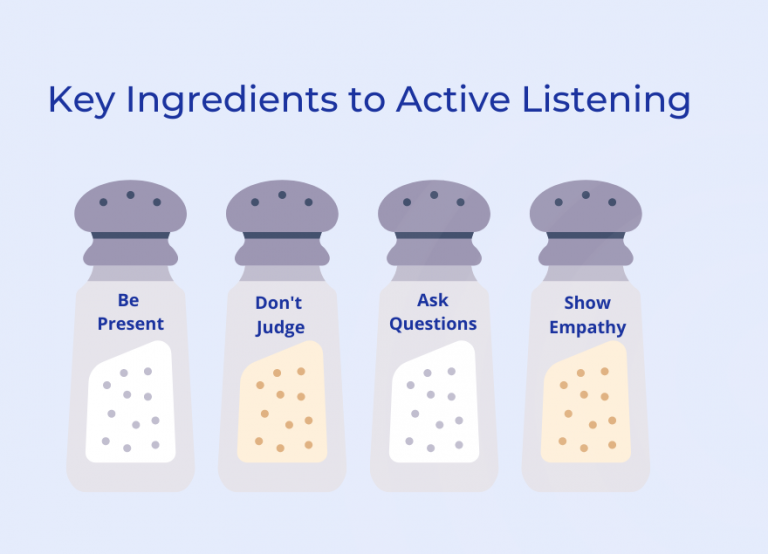
In his Ted Talk, sound expert, Julian Treasure, warns us of the harmful effects of losing our listening. He explains, “Conscious listening is our access to understanding.” Treasure points out that in today’s media, everything we see and hear has to have a flashy headline to quickly attract our attention, if not, we tend to not listen. In a way, we have become desensitized from the things we hear. This is why it is important to focus on developing our listening skills.
With this in mind, Treasure shares five ways to better your listening skills, one of them being the acronym, RASA.
- Receive- Give the speaker your attention. If your role relies mostly on over-the-phone communications, it can be easy to skip this step, yet it is very crucial. You may think that since you do not have someone in front of you to make eye contact with, that you are spared from this portion, but we may argue that you will have to work that much harder at focusing your attention on the caller.
- Appreciate- Appreciating the speaker is developed through mirroring emotions and body language. You can appreciate your caller by saying short words and sounds similar to “ooh,” “ah,” “wow,” “I see.” These short phrases and pause fillers allow the caller to know that you are engaged.
- Summarize- Treasure mentions the importance of the word “so.” Try using the word “so” in your conversations to close segments of your conversation. It allows you to paraphrase and confirm your understanding. “So, you mentioned you filed your paperwork back in May.”
- Ask- Ask questions throughout the entire conversation and focus on open-ended questions. Open-ended questions will spark a conversation where you discover more details and tune into deeper emotions.
For an in-depth look at RASA, click here.
What is Reflective Listening?
Reflective listening by definition “is the process of paraphrasing and restating both the feelings and words of the speaker.”
Reflective listening allows:
- The speaker to know that you are trying your best to understand them
- You to get to the real root of the issue
- Allows you to get buy-in from the speaker
- Allows the speaker to correct your understanding
A Penn State University blog notes that both active listening and reflective listening are great methods to ensure effective communication. They state, “The difference between the two is one reflects the other person’s thoughts back into themselves and the other requires you to engage in the conversation and show recognition of their thoughts. Through reflective listening, we can be a mirror to their mind that will help sort out their thoughts. “
When you are speaking to a customer, try your best to paraphrase throughout the interaction. Paraphrasing allows you to reflect on what the customer said and allows them to confirm or correct your understanding.
It’s a big waste of time when you start working on solving an issue, yet you later figure out that the issue you are working on isn’t really what the customer needed. Reflective listening and paraphrasing can save you a lot of time and heartache.
I couldn’t agree more that reflective listening is a key element of improving your customer service. I remember one too many times where I misheard the caller or misinterpreted what they said because I was rushing and not verbally reflecting on the conversation, I would end up making a mistake or helping the caller with something completely different than what they needed. This usually only upset them more.
When I learned to reflect and paraphrase the caller’s situation, I found that it would help me focus on the correct things. This in turn made the caller happy because I was attentive and efficient. Reflecting and paraphrasing also saved me from personal frustration. All around, it was a win-win!
Examples of Reflective Statements:
Customer 1: “I’m not sure why I haven’t received a call back about my case. I have called at least once a week and have not heard back. I feel like my case will never get handled. I just want to move on with this chapter of my life already.”
Your Response: “I am so sorry about the frustration and stress this has added to you in an already difficult situation. I want to make sure I have this correctly. You have called multiple times without any call back regarding your case?”
Customer 2: “I am having issues with my order. I just received it, and it is not working.”
Your Response: “I apologize for the issues you are having, but do not worry. We will get you all taken care of. When you say it is not working, what do you mean exactly? Can you tell me what you’ve done to try and fix it?”
Customer 3: “I wanted to get a status on my tax return. It’s been a few months now, and I still haven’t received them. Lynn assured me I would receive my return last week, but I still don’t have it. Did we do something wrong?”
Your Response: “It sounds like you are a bit worried about your return. I apologize that you haven’t received it yet, I know how important receiving that can be. Allow me one moment please to check with Lynn.”
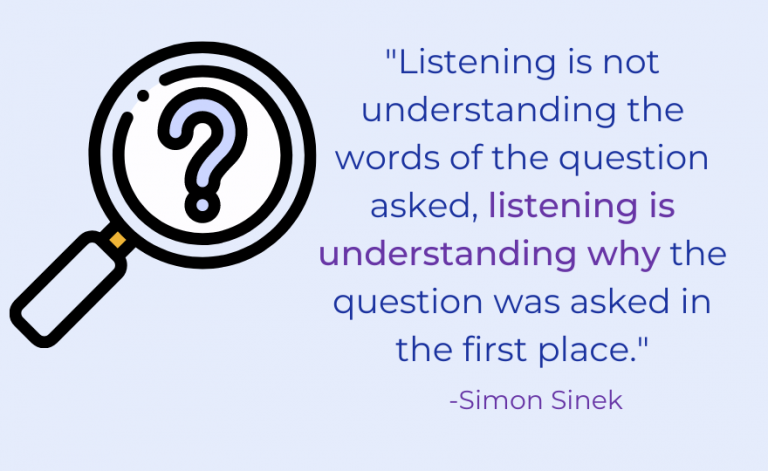
As author and inspirational speaker, Simon Sinek mentions, it is important to look beyond the words and questions being said by your caller or customer. To best help them, reflect on why they are calling in the first place. What is it that they truly need? What is it that is truly bothering or upsetting them? What would the caller want to hear and have happen to be satisfied? What can I say or ask to clarify the situation?
The Different Types of Questions You Can Ask:
There are many techniques you can use to improve your customer service skills and improving your questioning techniques can help you make big strides in improving your listening skills. Let’s review the top three questioning techniques that can help elevate your customer service skills:
- Open-Ended Questions- open the lines of communication
- Closed-Ended Questions- allow you to get quick and direct answers
- Probing Questions- allows you to dig deeper into the conversation
Open-Ended Questions
Understanding the how and when to use different questioning techniques is important. There are specific moments that call for different types of questioning asking.
According to Serviceskills.com, “Open-ended questions are those that encourage continued conversation. They generally require more than one or two words to answer, and they’ll help you to get more information about a situation. Open-ended questions often give insight into the other person’s feelings. They draw out more details.”
If you want someone to open up to you and give you more details, use open-ended questions!
Here are a few examples of open-ended questions:
- What can I help you with today?
- Tell me, what key factors will help you make a decision?
- How do you feel about the service we provided?
- Is there anything else I can do for you today?
- What has your experience been with our company?
Closed-Ended Questions
According to Hotjar.com, “Closed-ended questions are questions that can only be answered by selecting from a limited number of options, usually multiple-choice, yes or no, or a rating scale.”
If you are looking for a direct answer, use closed-ended questions!
Here are a few examples of closed-ended questions:
- Did you receive your order?
- What day did you place your order?
- Would you recommend our company to a friend?
- Are you a new or current client?
- Would you like to leave a message?
- Are you satisfied with our service?
Probing Questions
Probing questions allow you to build rapport with your customer, unveil the facts, and give you more clarity to a customer’s true wants, needs, and desires. It helps turn a conversation that is in a gray area to become more black and white.
Here are a few examples of probing questions:
- What difficulties have you encountered?
- What happened when it stopped working?
- What did you see on your screen?
- What error code did you come across when you hit that button?
- What outcome are you hoping to achieve?
- When did you begin experiencing this?

Great Listening Requires More than Listening
The Harvard Business Review notes that oftentimes we consider effective listening as someone who remains quiet for most of the conversation. In a recent study, the Harvard Business Review found that good listening takes more than just silence.
Jack Zenger and Joseph Folkman note, “We analyzed the data describing the behavior of 3,492 participants in a development program designed to help managers become better coaches. As part of the program, their coaching skills were assessed by others in 360-degree assessments. We identified those who were perceived as being the most effective listeners (the top 5%). We then compared the best listeners to the average of all other people in the data set and identified the 20 items showing the largest significant difference. With those results in hand, we identified the differences between great and average listeners and analyzed the data to determine what characteristics their colleagues identified as the behaviors that made them outstanding listeners.”
They found that contrary to the popular assumption that good listeners are silent, good listeners are actually those who periodically ask questions with the intention to promote discovery and insight.
Oftentimes, we can shy away from asking our callers questions because we assume that they will tell us everything we need to know. By the same token, we can also tend to shy away from asking questions because we don’t feel confident enough to do so.
Callers can be fun and great to talk to, but callers can also be aggressive and strong-willed. Usually, when callers call in, it’s because they need something from us. Oftentimes, the reason for their call is because of an upsetting, frustrating or stressful matter. As hard as it may seem, it’s important to overcome the fear of asking questions. Have the mindset that you are the person that can help them, and in order to do that, you have to discover their true needs.
If you shy away from asking questions and getting clarity over the situation, how helpful can you really be? Your lack of assertiveness can actually make the situation more frustrating for the customer because their true needs aren’t being met.
Keep in mind that you are asking questions for their benefit. Questions are helpful!
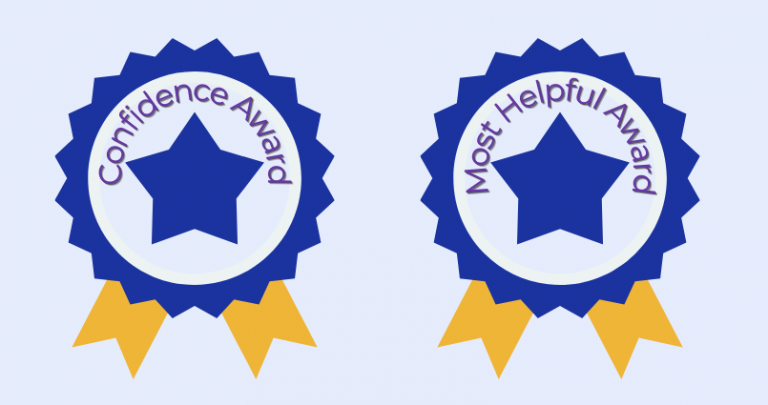
What is Empathetic Listening?
Empathetic listening is defined by mindtools.com as, “a structured listening and questioning technique that allows you to develop and enhance relationships with a stronger understanding of what is being conveyed, both intellectually and emotionally. As such, it takes active listening techniques to a new level.”
While active listening and reflective listening are important, empathetic listening calls for a strong connection. Empathy allows you to understand without assuming. In his book, The 7 Habits of Highly Effective People, Stephen R. Covey mentions the importance of seeking to understand, then to be understood. Covey states, “In empathetic listening, you listen with your ears, but you also, and more importantly, listen with your eyes and with your heart. You listen for feeling, for meaning. You listen for behavior. You use your right brain as well as your left. You sense, you intuit, you feel.”
In customer service, it can be easy to quickly diagnose someone’s needs and to then try to get our point across. We’re in a rush, rush, rush, mentality, that it can be easy to try to dominate a conversation and send our customers on their merry way. While this method can seem efficient in the short term, it’s actually inefficient in the long run.
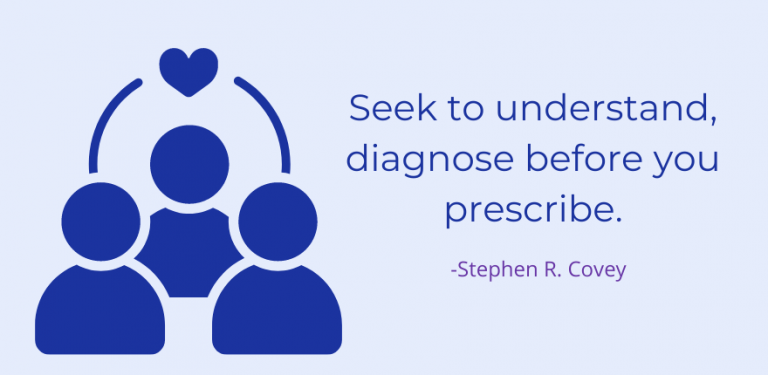
I remember helping a caller with their situation and trying to skim their needs as they were talking. Without asking questions or spending too much time trying to understand their point of view, I gave them a quick answer and considered the call a success.
Not even an hour later, the caller called back and mentioned that what I helped them with wasn’t what they needed. The second time around, I was so embarrassed and took the time to listen empathetically. I listened, probed, paraphrased, and tried my best to see the issue from their point of view.
Had I spent the time listening empathetically from the beginning, I wouldn’t have had to spend more time fixing my mistake.
Connect Through Listening
In the end, empathy and connection are the very foundation of any great experience. Naturally, they want and need to connect is important to everyone, but when our ears are closed, so are our hearts[CH5].
This is why effective listening dials in on creating empathetic connections. When your mind and ears are open, you can pay attention to your customer and build a connection off of what they are saying. Your ability to listen directly correlates to your ability to connect and understand your caller.
In his book, Everyone Communicates, Few Connect, author John C. Maxwell talks about the importance of connecting with others, and how it gives us influence in every situation.
Here are some of the findings Maxwell noted in Everyone Communicates, Few Connect:
High Achievers:
- Care about people as well as profits
- View subordinates optimistically
- Seek advice from those under them
- Listen well to everyone
Average Achievers:
- Concentrate on production
- Focus more on their status
- Are reluctant to seek advice from those under them
- Listen only to superiors
Low Achievers
- Are preoccupied with their own security
- Show a basic distrust of subordinates
- Don’t seek advice
- Avoid communication and rely on policy manuals
Maxwell mentions a study conducted by social psychologist Jay Hall, Ph.D. on 16,000 executives. Dr. Hall worked on distinguishing a correlation between success and one’s ability to care for others. Dr. Hall’s study demonstrates the direct correlation between someone’s ability to connect and their success. To be the best in your role and to exceed to new heights, it is important to realize that we are in the people business.
Empathizing, connecting, listening, and asking questions all allow us to focus on building our relationship with our customers. Effective listening helps us decode the other person’s message enough to then be able to build on that conversation to establish trust and connection.
When your customers or callers can trust you; they are more inclined to cooperate with you. I’ve had it many times where callers would refuse to provide me with the information, I needed to help them. While it was in their benefit to provide me with the information I needed, they still refused to provide it.
What I found was that in the situations where I spent time connecting with the caller, listening to their needs, decoding their words, and asking questions, they were more likely to work with me because they felt that I cared and that I genuinely wanted to help them.
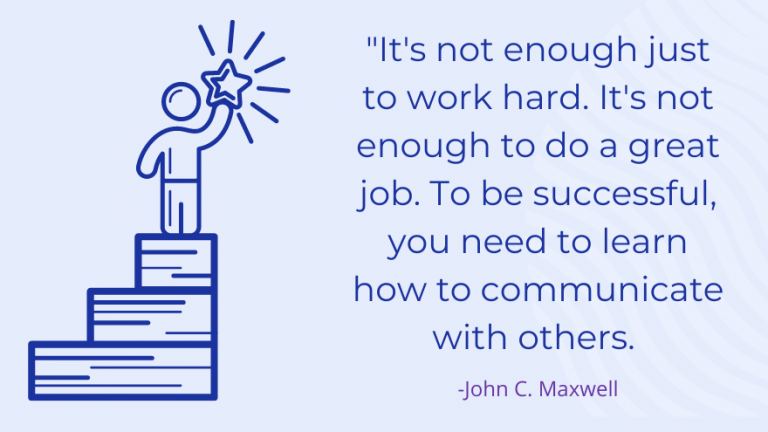
The One Question to Ask Yourself
While asking questions to our callers helps us provide a better experience, it’s also important to internally ask ourselves questions.
Forbes.com opens the possibility of new perspectives and explanations by asking ourselves one question to diffuse any situation: What else could this mean?
These five simple words allow you to take a moment to read between the lines. It’s true that everyone has their own perspective on a situation, whether true or not, someone’s perspective is their true reality.
If you are on the phone and someone is possibly irate or frustrated, ask yourself, “What else could this mean? What does this situation mean to them? Why is this issue so important?” This one question allows you to have a 360 view of the issue at hand.
Effective listening grants you the power to move your relationships forward. Whether over the phone or in person, listening is an important tool that we constantly have to work on improving. To be successful at anything, we must succeed with people. Your ability to connect with others directly correlates to how successful you will be. Remember that taking the time to listen can prove more productive, even if it seems time-consuming. Your best shot at de-escalation and at creating above and beyond experiences begins with being heart-centered. Care enough about those you are helping to listen to their true needs, wants, and desires.
